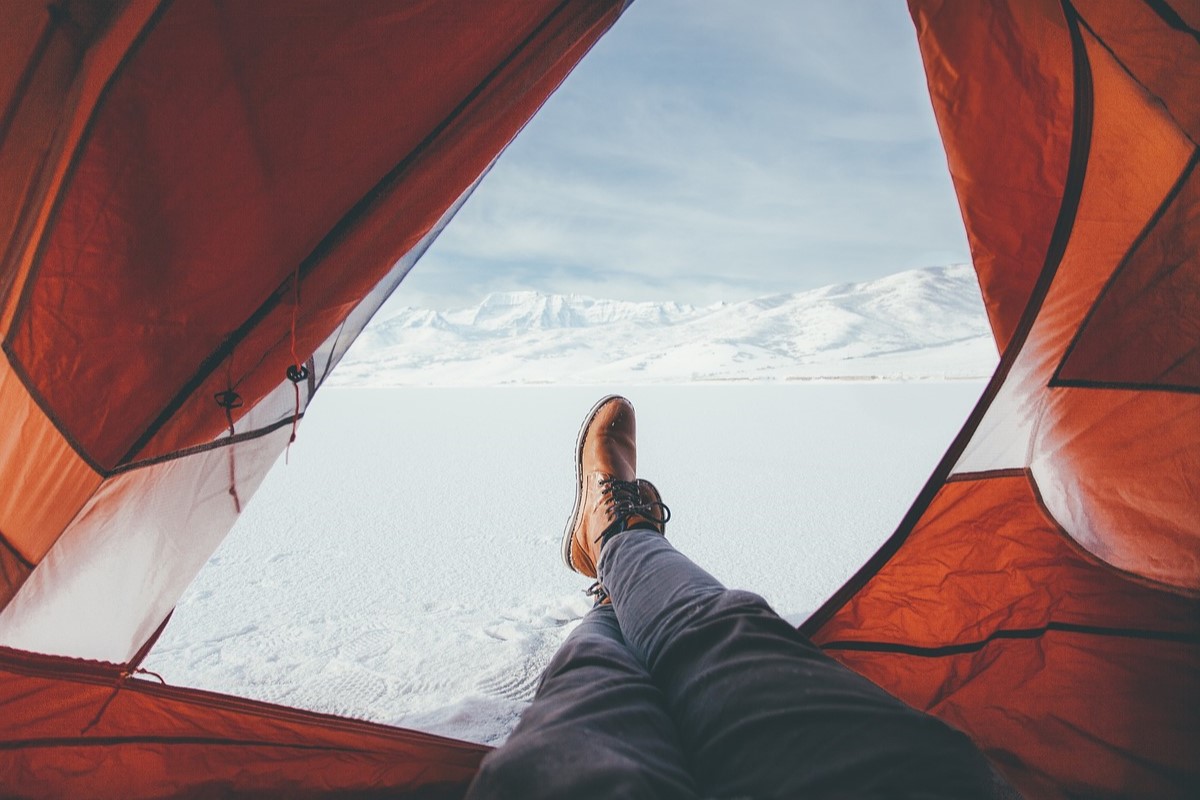Winter camping in a tent can be a magical experience, allowing you to connect with nature in its purest form. However, it also comes with its challenges, especially when it comes to staying warm and comfortable in the chilly winter nights. Whether you’re a beginner or an experienced camper, these 15 tips for tent camping in the winter will help you make the most out of your outdoor adventure.
1. Choose the Right Tent: Invest in a high-quality winter camping tent that is specifically designed to withstand harsh weather conditions. Look for features like strong poles, durable fabric, and proper ventilation to ensure a comfortable stay.
2. Insulate Your Tent: Place a ground tarp or an insulating pad beneath your sleeping bag to prevent the cold ground from sapping your body heat. Additionally, consider using foam pads or inflatable sleeping pads for extra insulation and cushioning.
3. Opt for a Four-Season Sleeping Bag: Invest in a high-quality four-season sleeping bag designed for winter camping. Look for bags with a lower temperature rating than the expected night temperatures to stay warm and cozy throughout the night.
4. Layer Up: Dress in layers to regulate your body temperature effectively. Wear moisture-wicking base layers to keep sweat away from your skin, insulating layers for warmth, and a waterproof and windproof outer layer to protect against the elements.
5. Stay Dry: Keep your clothing and gear dry at all times. Pack waterproof bags and covers for your backpack, sleeping bag, and other essentials. Wet clothes and gear can significantly reduce your body temperature and make you feel colder.
6. Ventilation is Key: Proper ventilation inside your tent is essential to avoid condensation, which can make your sleeping bag and clothes damp. Partially unzip your tent door or windows to allow for airflow without compromising your warmth.
7. Eat High-Energy Foods: Consume high-energy foods and warm beverages to fuel your body and maintain your core temperature. Hot soups, stews, and hot drinks can provide a quick boost of warmth and energy.
8. Stay Active During the Day: Engage in physical activities during the day to keep your body warm. Hiking, snowshoeing, or chopping firewood can help you generate body heat and stay warm throughout the night.
9. Use Hot Water Bottles: Fill a heat-resistant water bottle with hot water and place it inside your sleeping bag. This natural heating source can keep you warm for several hours, allowing you to sleep comfortably.
10. Master the Art of Layering: Layering your clothing extends beyond just wearing multiple layers. Adjust your layers according to your activity level and the changing weather conditions. Remove or add layers as needed to maintain a comfortable body temperature.
11. Keep Your Feet Warm: Cold feet can make you feel incredibly uncomfortable. Invest in high-quality insulated and waterproof winter boots to keep your feet warm and dry. Use moisture-wicking socks to prevent sweat accumulation.
12. Learn to Properly Set Up Camp: Choose a sheltered campsite away from strong winds and falling snow. Clear the area where you’ll set up your tent to create a flat and stable surface. Proper camp setup can significantly impact your comfort level during winter camping.
13. Master the Fire-Making Skills: If it’s safe and allowed in your camping area, learn how to build a fire efficiently. A campfire not only provides warmth but also serves as a focal point for socializing and cooking hot meals.
14. Plan for Longer Nights: Winter nights are longer, so be prepared for extended periods of darkness. Pack headlamps, lanterns, and extra batteries to illuminate your campsite and perform tasks during the long nights.
15. Stay Informed and Be Prepared: Stay updated on weather forecasts and be aware of the local conditions. Carry a winter camping tent gear list that includes essential items like a first aid kit, emergency whistle, and navigation tools. Being prepared can make a significant difference in your camping experience.
Winter Camping Tent gear List
Here’s a comprehensive winter camping tent gear list to ensure you’re well-prepared for your winter outdoor adventure:
1. Winter Camping Tent:
- Choose a sturdy and well-insulated four-season tent designed for winter conditions.
- Ensure the tent is equipped with proper ventilation to reduce condensation.
2. Sleeping System:
- Four-season sleeping bag with a lower temperature rating than expected night temperatures.
- Insulating sleeping pad or mattress to provide insulation from the cold ground.
- Additional foam pad for extra insulation and cushioning.
3. Clothing:
- Moisture-wicking base layers to keep sweat away from the skin.
- Insulating layers (fleece, down jackets) for warmth.
- Waterproof and windproof outer layers (jacket and pants) to protect against the elements.
- Waterproof and insulated gloves or mittens.
- Warm hat or beanie to retain heat.
4. Footwear:
- Insulated and waterproof winter boots.
- Moisture-wicking and insulated socks.
- Gaiters to keep snow out of your boots.
5. Cooking and Food:
- Portable camping stove with sufficient fuel supply.
- Cooking utensils, pots, and pans suitable for winter cooking.
- High-energy, non-perishable food items.
- Thermos for keeping hot drinks and soups warm.
6. Hydration:
- Insulated water bottles or hydration reservoirs.
- Insulating sleeves to prevent water from freezing.
- Avoid carrying water filters that may freeze; opt for chemical treatments or melting snow for water.
7. Lighting:
- Headlamp with extra batteries.
- Lanterns or camp lights for illuminating the campsite.
8. Safety and Navigation:
- First aid kit with supplies suitable for cold weather injuries.
- Emergency whistle.
- Navigation tools such as a map, compass, or GPS device.
- Multi-tool or camping knife.
9. Snow Tools:
- Snow shovel for clearing the campsite and creating a snow shelter if necessary.
- Ice axe and crampons for traversing icy terrain (if applicable).
10. Miscellaneous:
- Repair kit for tent, sleeping pad, and clothing.
- Duct tape for quick fixes.
- Hand warmers and foot warmers for added warmth.
- Personal hygiene items and waste disposal bags.
11. Entertainment and Comfort:
- Books, cards, or other entertainment items for downtime.
- Compact, lightweight camping chair or portable seat pad for comfort.
Remember to customize this list based on your specific needs, the duration of your camping trip, and the winter conditions you expect to encounter. Being well-prepared with the right gear will enhance your winter camping experience and ensure a safe and enjoyable adventure.
By following these 15 tips for winter camping in a tent, you can ensure a safe, warm, and enjoyable outdoor adventure. Remember to stay informed, be prepared, and embrace the beauty of winter camping while staying warm and cozy in your tent. Happy camping!
Read More
24 Hour Beaches Near Me, Ultimate Guide
Winter Camping Tips for Dogs: How to Keep Dog Warm & Safe
Winter Camping Destinations in USA for Your Ultimate Winter Camping Bucket List
Varadero Cuba Beaches: A Tropical Paradise Beckons
Romar Beach Access, Condos, Houses, Cottages, And Rentals
Gulf Shore Beach Rentals, House, Hotel, Chair, Cam, Rules, Weather

